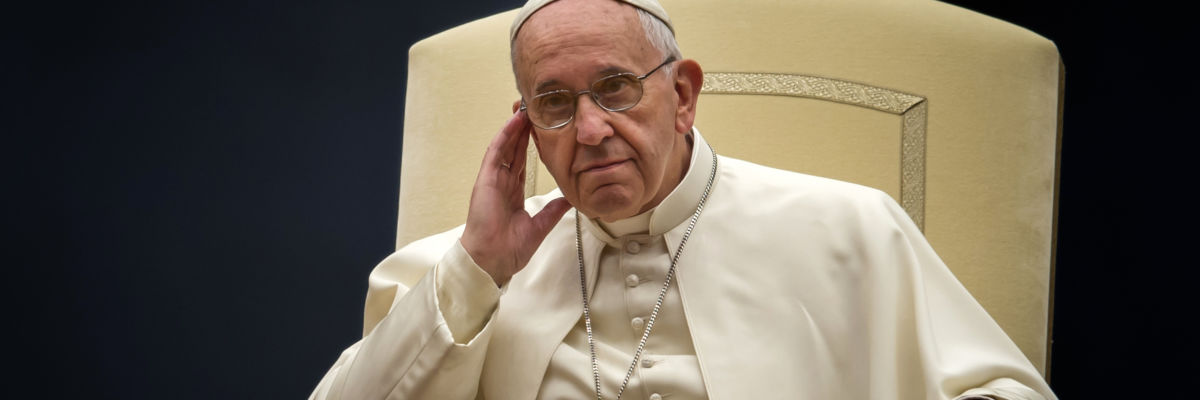
One fateful night, after a Thanksgiving dinner prep run with too much of last year’s cranberry sauce, apologist Trent Horn retires for a fitful night’s sleep . . . and finds himself confronted with a shady character . . .
DAVID: Let’s talk about Catholicism. You’ve got to admit, there’s one nice thing about being a Protestant apologist over being a Catholic apologist.
TRENT: What’s that?
DAVID: As a Protestant, you have a fixed number of data to defend. It’s just a set number of books of the Bible. After studying them, you know all the major objections people will throw at it. It’s not as though an atheist will say, “Can you believe that the Bible says this?”, and you need to turn on the evening news to see what he’s talking about.
TRENT: But for Catholics, it’s different.
DAVID: Right! You have to deal with everything that was said by the popes and Church councils for 2,000 years after Christ.
TRENT: So far, the only difficulty you’ve presented is that Catholic apologists have to do more homework than Protestant apologists. We have more to cover, but the historical objections to Catholicism are pretty well worn. When you read Luther, Calvin, Turrentin Whittaker, Salmon, and modern Protestant apologists, you see similar objections being raised in each work. It’s more material to know, but it’s not a different kind of problem.
DAVID: Not quite. It’s not just that you have to know more material to learn; it’s that the amount of that material continues to grow every day. And with each day that passes, you face the threat of a contradiction that will falsify Catholicism emerging from the mouth of a pope or the bishops. I mean, on more than one occasion, you’ve had to go online to find out about yet another controversy surrounding Pope Francis’s off-the-cuff remarks.
TRENT: They frustrate me, but a comment he says to a reporter or a filmmaker isn’t part of Catholic teaching.
DAVID: Just wait till they make their way into an encyclical. As a Catholic, you have to live in fear that Pope Francis, or the next pope after him, or the bishops as a whole, are going to contradict a supposedly infallible teaching of the Church. How long do you think it will be before the pro-gay lobby in the Church gets the Magisterium to teach that sodomy and the marital act are morally equivalent? Or that contraception is not immoral? Once that happens “it’s game over, man. Game over!”
TRENT: By that logic, it’s “game over” for most Protestants and even Eastern Orthodox who have accepted the morality of contraception and remarriage after divorce. Why in the world would I leave Catholicism because of a speculative fear that it will embrace these errors in favor of churches or communities that have already embraced them?
DAVID: But you’re assuming that they are errors. What if they aren’t, and the Catholic Church is wrong about contraception and divorce?
TRENT: We’ll get to contraception later, but Jesus made the issue of divorce and remarriage crystal-clear: “Whoever divorces his wife and marries another, commits adultery against her.” This teaching may be difficult to live out, but it’s not difficult to understand. If Jesus walked out of his own tomb, then I’m going to trust him on this one.
DAVID: Okay, fine. But even if the Protestant apologists are wrong about the content of the book they’re sworn to defend, that doesn’t change the fixed nature of the book. Protestants get to have a “here’s what Jesus said, that’s it” attitude. You don’t. They don’t have to worry about a pope waking up one day and falsifying their whole worldview. They have only the Bible. They know what it says, and that’s that. You can see how that would make some people hesitant to take on the baggage associated with Catholicism.
TRENT: Your objection seems to be that an event in the future could falsify Catholicism, but it’s far less likely, or maybe even not possible, for a similar future event to falsify Protestantism.
DAVID: More or less.
TRENT: Okay. First, it is possible that Protestantism could be falsified in the future. For example, when atheists ask some Christian apologists, “What would it take for you to give up your faith?”, as you did just a moment ago, they often give examples like “a letter from the apostles saying they were frauds” or “archaeologists finding a bone box that says ‘Jesus of Nazareth.’” So it’s not true that Protestantism is impervious to developments in the future that challenge its essential teachings.
DAVID: But doesn’t it unnerve you that it’s quite possible you could wake up one morning, get on the internet, and find out that Catholicism is false because Church teaching is now in conflict with itself? The odds of finding something like Jesus’ bone box is way, way less likely than the odds of a pope declaring a heresy.
TRENT: But how do you know that? If God exists and he raised Jesus from the dead, then it isn’t the case that the odds are lower merely because it’s easier for the pope to utter heresy than it is for archaeologists to find Jesus’ bone box. If the Holy Spirit tells us Jesus rose from the dead, then there is no bone box to be found. Likewise, if the Holy Spirit tells us Christ established the Catholic Church, then the pope will never formally bind the Church to a theological error.
DAVID: Ah, notice you’re hedging your bets with phrases like “formally bind the Church to error” instead of just “say something heretical.” Protestants don’t have to have a million qualifications for the Bible.
TRENT: Once again, that’s not true. Even conservative Protestants who fully defend the inerrancy of Scripture say that applies only to the original copies of Scripture. Since those don’t exist anymore, it is possible that a copy of a biblical manuscript has an error in it. Fortunately, we have enough copies of the Bible to determine where those copying errors happened. Remember when I wrote a whole chapter about this in my book Hard Sayings?
DAVID: So you’re saying that just as Protestants believe that the Holy Spirit protects the Bible from asserting errors only under certain conditions, the same is true of the Holy Spirit’s protection of the pope: terms and conditions apply.
TRENT: Yes. For example, if the pope is just speaking as a private theologian, then he could be in error. But here’s the deal: My confidence in the Church doesn’t come from looking forward and estimating a low or nonexistent probability of a “falsifying event” occurring. It comes from looking backward and concluding that Christ established the Church and, because of this fact, he will protect it with the charism of infallibility. Just as a Protestant apologist is confident that the Bible is without errors not because he has solved every difficulty, but because he trusts in the Bible’s divine origins, I am confident in the Church because of the good evidence of its divine origins. Without the Church, you wouldn’t even be able to know what counts as Scripture to be your fallback authority . . .
. . . and the debate continues in Trent’s new book, Devil’s Advocate, available for sale at the Catholic Answers Shop. Purchase your copy here.
Image credit: Catholic Church England and Wales via Flickr, CC BY-NC-ND 2.0.



